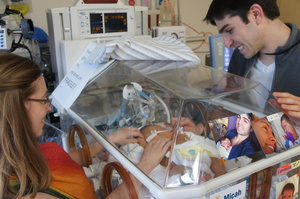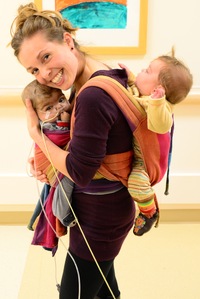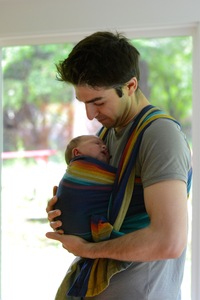My twin's premature birth rocked my world. Micah and Zachary were born at 27 weeks gestation, weighing only two and a half pounds each. As the twins fought to live, our family, friends, neighbors and colleagues surrounded us with love and support.
During the twin's hospitalization, my husband Noah and I received beautiful, generous gifts, one of which changed our family's life: the skill of babywearing.
Micah and Zachary were nearly three months into their hospitalization when my friend Becca asked if she could visit us in the NICU to show us how to wear our babies in a wrap. I hesitated. Zachary was stable, even though he was connected to lines and monitors, but Micah was struggling just to live after developing necrotizing enterocolitis (NEC). Micah was in renal failure, intubated, and recovering from a major abdominal operation.
I didn't want to have to answer any of Becca's questions. I didn't want Becca to see Micah in such a terrible state of health. I didn't want to have to explain that Micah might die.
Thankfully, I mustered up some courage and arranged for Becca to visit.
Becca walked into Zachary's room, her arms overflowing with two wraps, a ring sling, gifts for the boys and food for us. Zachary was tethered to his monitors, snuggled with Noah in a chair.  Becca stretched out a rainbow carrier and asked if she could wrap me up with Zachary.
Becca stretched out a rainbow carrier and asked if she could wrap me up with Zachary.
Moments later she began her magic and Zachary was securely wrapped on my chest, just under my chin, leaving my hands free. I stood up, paying attention to Zachary's cords and wires, and instantly fell in love with babywearing.
With Zachary wrapped on my chest, I reclaimed so much that had been taken away from me just by being in the NICU: the ability to be close to my babies, the ability to care for them, and the feeling of being a competent mother.
I asked Zachary's nurse if we could walk across the hall to Micah's room for a visit. Micah and Zachary had been separated since birth, each of them independently too sick to leave their room to visit the other. But now, Zachary was stable, and securely wrapped on my chest. The nurses had never seen one of their patients in a wrap, and inspected Zachary's airway and lines before they agreed to allow me to carry Zachary into Micah's room.
For the first time since giving birth, I made physical contact with my twins at the same time. Even though Micah was too sick to be held, I could reach my hands into his isolette and touch his soft skin, while Zachary slept on me. From that moment on, I knew I needed to perfect the art of wrapping my fragile infants so that I could be close to both of them. For months, we had been separated. Babywearing enabled us to reconnect, bond, and nurture one another.
 I practiced wrapping stuffed animals, watched instructional videos, and soon became competent in wrapping Zachary. Weeks later, Zachary was discharged, yet Micah's hospitalization continued. Once Zachary was strong enough to be worn on my back, I learned how to tandem carry, with Micah wrapped in front. Babywearing became an integral part of our journey.
I practiced wrapping stuffed animals, watched instructional videos, and soon became competent in wrapping Zachary. Weeks later, Zachary was discharged, yet Micah's hospitalization continued. Once Zachary was strong enough to be worn on my back, I learned how to tandem carry, with Micah wrapped in front. Babywearing became an integral part of our journey.
Babywearing my medically fragile infants required me to communicate and demonstrate to the medical team that I knew how to keep my babies safe. Here's my advice for babywearing medically fragile babies. You must:
- Demonstrate that you have the skills to keep your baby safe while wrapped. You may need to build confidence in your baby's care team.
- Understand how to protect your baby's lines, wires, cords, and medical devices.
- Understand how to read your baby's monitors and be attuned to your baby's signs of distress.
- Know how to keep your baby's airway open and unobstructed.
- Be skilled at wrapping and unwrapping.
A medically fragile infant may be ready to be wrapped if s/he:
- Does not have breathing/other episodes.
- Can be easily moved and carried.
- Has central, PICC, or other lines that are secured and protected.
- Is stable and predictable.
Babywearing is one of the most incredible gifts for families with fragile infants because it facilitates the closeness they desperately need. Babywearing can even help to support a mother's milk supply, which is critical to the health of premature and fragile babies.
Tragically, Micah died from complications of NEC when he and Zachary were 11-months-old. Days after Micah's passing, Becca came to us with another extraordinary gift. She designed a woven wrap in honor of Micah, using the maize and blue colors of our children's hospital to celebrate his care team, along with a rainbow to celebrate his bright smile and soul. Becca named the woven wrap Micah's Rainbow. 
The gift of babywearing continues to touch our family daily. Micah and Zachary's baby brother, my rainbow baby Elijah, spent much of his first year of life in a carrier, wrapped up in our love. Babywearing rocks and we could not imagine parenting without our carriers. I am forever grateful to have received this gift during my babies' hospitalization.
If you know a family with a medically fragile infant, ask if you can help them learn how to wear their baby. If your baby is in the hospital, get a carrier and start practicing so that when your baby is ready, babywearing can bring the two of you together. If you want to change someone's life, teach them how to wear their baby.